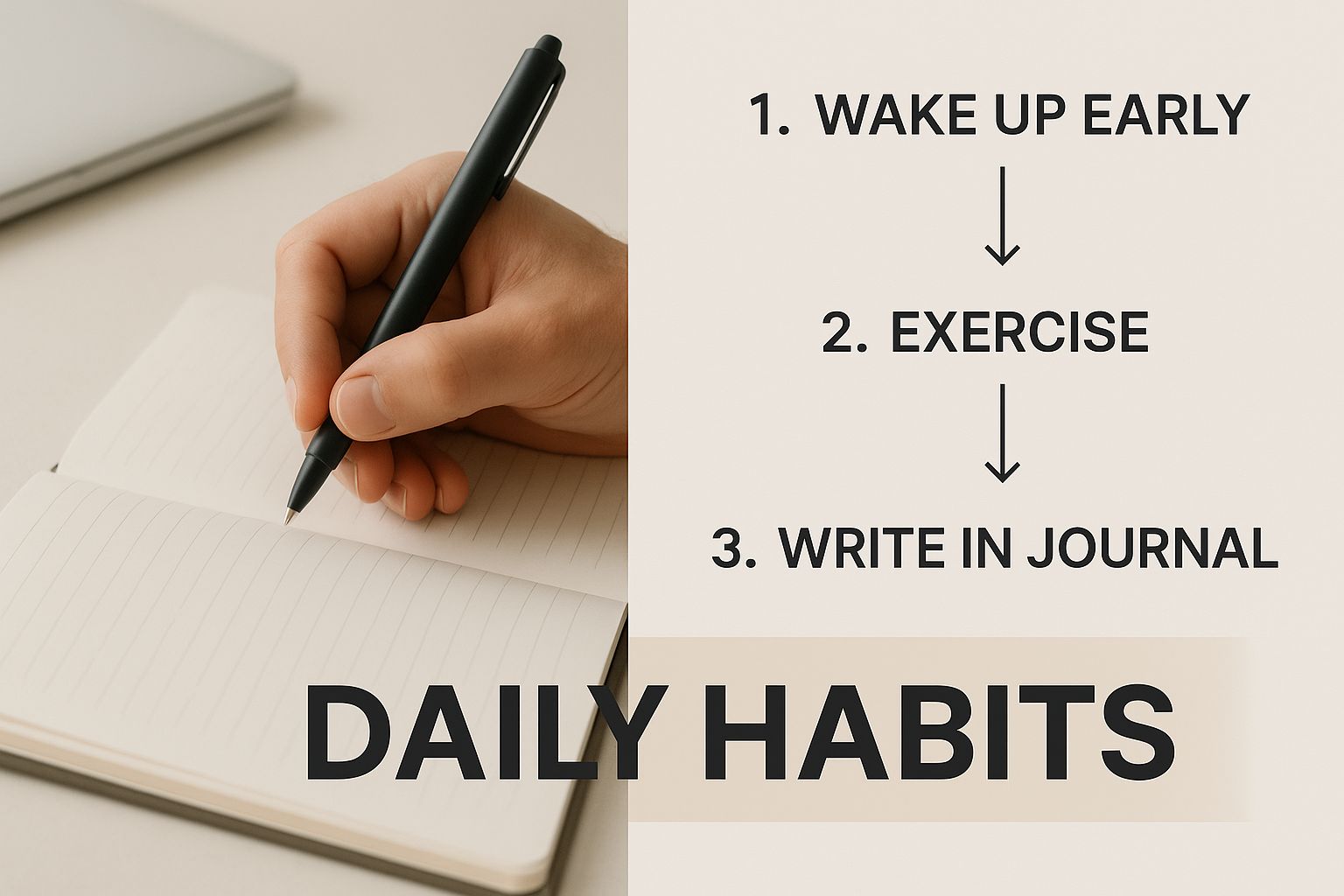Knowing how to build mental resilience isn't about avoiding hardship. It's about developing a set of practical, learnable skills that help you manage stress and recover when life throws you a curveball. Think of it as building your own personal defence system through tangible mindset shifts, lifestyle habits, and the right support.
Why Mental Resilience Is Your Most Critical Skill Today

In a world that never seems to slow down, mental resilience has gone from a "nice-to-have" soft skill to an absolute necessity. It's the psychological equivalent of physical fitness—something you train and strengthen over time so you can handle whatever comes your way, from pressure at work to personal setbacks.
This isn't about putting on a brave face or ignoring your problems. Far from it. Real resilience is the ability to bounce back effectively after a tough experience. It’s about finding your centre and maintaining a sense of stability when everything around you feels chaotic.
The Rising Tide of Stress and Burnout
The need for this skill has never been more pressing. Recent UK trends paint a stark picture, showing a significant rise in mental health challenges that highlights why we need stronger internal defences. The incidence of diagnosed depression in adults in England, for instance, nearly doubled between 2014 and 2022.
On top of that, 23% of working-age adults reported high anxiety levels in 2023—a sharp increase since the pandemic began. These aren't just numbers; they represent a society under immense strain.
When that pressure becomes chronic, it often spirals into burnout, leaving you emotionally, physically, and mentally exhausted. This doesn't just damage your personal well-being; it chips away at your professional performance, creativity, and drive. If you're feeling that strain, it’s crucial to understand the signs and learn how to recover from burnout before it takes root.
Building resilience is a proactive strategy. It gives you the tools to manage stress before it escalates, allowing you to face adversity without losing your footing.
Ultimately, strengthening your mental resilience is one of the best investments you can make in your long-term health and happiness. It’s the foundation for a more stable, focused, and fulfilling life, no matter the obstacles. The next sections will give you a practical roadmap to get there.
Mastering Your Mindset for Lasting Fortitude
Real, lasting fortitude isn't built on flimsy advice like "just stay positive". It starts inside, with the conscious work of shaping your internal dialogue. To build resilience, you must learn practical, repeatable techniques that fundamentally change how you interpret and react to what life throws at you.
This isn't about pretending bad things don't happen. It’s about learning to catch destructive thought patterns in their tracks, before they spiral out of control. With practice, you can start to see challenges not as soul-crushing threats, but as genuine opportunities to grow stronger.
Spot and Challenge Unhelpful Thoughts
Your first action is to become a detective of your own thoughts. When stressed, most people fall into common thinking traps without noticing. These automatic negative thoughts are absolute saboteurs when it comes to building resilience.
Have you ever made one tiny mistake at work and had your brain leap to, "That's it, I'm getting fired"? That’s a classic example of catastrophising. Or maybe you've finished a project that's 99% brilliant, but all you can do is fixate on the 1% that could have been better? That's a mental filter at work.
Start by looking for these common culprits in your own thinking:
- All-or-Nothing Thinking: Seeing everything in black and white. If your performance isn't perfect, you write yourself off as a complete failure.
- Overgeneralisation: Taking one negative event and spinning it into a never-ending pattern of defeat. A single bad date suddenly means, "I'll be alone forever."
- Personalisation: This is where you blame yourself for things that are completely out of your hands.
Once you can put a name to these patterns, you can dismantle them. Ask yourself direct questions: "Is there another way to look at this?" or "What proof do I actually have that this thought is true?" This act of questioning shatters the automatic loop, giving you the breathing room to choose a more balanced view.
A Quick Guide to Reframing Your Thoughts
Challenging a thought is half the battle; the other is actively reframing it. Use this table as a quick-reference guide to swap out unhelpful thoughts for more resilient and constructive alternatives.
Mindset Shifts for Building Resilience
| Unhelpful Thought Pattern | Resilient Alternative | Practical Example |
|---|---|---|
| Catastrophising (Assuming the worst-case scenario) | Reality-Testing (Focusing on what's most likely) | Instead of "This presentation will be a disaster," try "I've prepared well. Some parts might be tricky, but I can handle them." |
| Mental Filter (Focusing only on the negatives) | Broadening Perspective (Acknowledging the whole picture) | Instead of dwelling on one piece of criticism, think "I received some tough feedback, but I also got praise for my creativity and effort." |
| Personalisation (Blaming yourself for everything) | Clarifying Responsibility (Separating your role from external factors) | Instead of "It's my fault the team missed the deadline," try "My part was late, but we also faced unexpected technical issues." |
Think of this table as your mental cheat sheet. Having these reframes handy makes it much easier to intercept negative thoughts before they take root and dictate your mood and actions.
Practice Cognitive Reframing
Cognitive reframing is the technical term for this process of consciously changing how you see a situation to change how you feel about it. It’s a powerful technique because it puts you firmly back in control.
Here’s how to do it: when you face a setback, like being passed over for a promotion, catch your gut reaction ("I'm not good enough"). Then, consciously form a new thought: "Okay, this is disappointing, but it's a great chance to get specific feedback on what skills I need to build for the next opportunity." The facts of the situation haven't changed, but your emotional state—and what you do next—will be completely different.
A resilient mindset doesn’t ignore reality or pretend challenges don't exist. Instead, it finds the lesson, the opportunity, or the element of control within that reality.
The small, positive daily habits you build are what truly reinforce these mindset shifts.

As this shows, consistent actions, like using a journal to practise reframing your thoughts, are the essential building blocks of a stronger mind. By consciously choosing your perspective again and again, you’re training your brain to make these constructive pathways its new default.
Cultivate Self-Compassion
Take this actionable step: treat yourself with the same kindness you’d offer a friend. Many of us have an inner critic that is far louder and harsher than we would ever be to someone we care about. This self-criticism grinds away at our confidence.
When you hit a setback, swap the self-criticism for self-kindness. Acknowledge that you're disappointed or frustrated without judging yourself for it. This isn’t about letting yourself off the hook; it’s about creating an internal environment that fosters growth instead of shame. Research shows that people who practise self-compassion are better equipped to handle tough situations.
Start with this simple action: pause when you notice that inner critic gearing up. Ask yourself, "What would I say to a friend in this exact situation?" Then, direct that same supportive message inward. It may feel awkward at first, but with repetition, it becomes an incredibly powerful buffer against whatever comes your way.
Actionable Lifestyle Habits for a Resilient Brain

While your mindset is a huge piece of the puzzle, your physical habits are the very foundation resilience is built on. Your brain and body are in constant conversation. The food you eat, how well you sleep, and how often you move have a direct impact on your brain's capacity to handle stress.
Building this foundation doesn't require a dramatic life overhaul. Small, consistent adjustments create the most profound shifts in your psychological wellbeing. Think of it as compounding interest for your mind—small, smart investments that grow over time, reinforcing your natural defences against life's pressures.
This approach has never been more vital. The modern workplace, for many, has become a major source of strain. Projections even show that by 2025, over 50% of the UK's working population could be dealing with significant mental health challenges. This isn't just a personal issue; it costs employers billions. You can read the complete analysis of these workplace mental health statistics to see the full picture.
Prioritise Restorative Sleep
Sleep is a non-negotiable biological need for mental resilience. When you sleep, your brain processes emotions, solidifies memories, and cleans out metabolic waste. Skimping on sleep sabotages this process, leaving your brain’s emotional centre on high alert and throwing your stress hormones out of whack.
Take these steps to get your sleep hygiene in order:
- Create a consistent schedule. Go to bed and wake up around the same time every day, even on weekends, to regulate your body's internal clock.
- Establish a "wind-down" routine. For the last hour before bed, step away from screens. Read a physical book, listen to calming music, or take a warm bath to signal to your brain that it's time to switch off.
- Optimise your environment. Make your bedroom a sanctuary for sleep: cool, dark, and quiet. Use blackout curtains and a white noise machine if necessary.
Fuel Your Brain with Smart Nutrition
The gut-brain axis is incredibly powerful. What you eat directly influences your mood and energy. A diet heavy on processed foods, sugar, and unhealthy fats can promote inflammation and anxiety. A diet built on whole foods provides the essential building blocks your brain needs to thrive.
Your daily food choices are a powerful tool for self-regulation. Each meal is an opportunity to either increase stress or foster calm.
Take these actions to fuel your brain effectively:
- Choose Complex Carbohydrates: Swap white bread or sugary cereals for oats, quinoa, or brown rice. They provide a slow, steady release of energy, preventing blood sugar crashes that cause irritability.
- Eat Healthy Fats: Get omega-3s from sources like salmon, walnuts, and chia seeds. These fats are crucial for the structure and function of your brain cells.
- Include Lean Protein: Add chicken, eggs, lentils, and chickpeas to your meals to ensure a steady supply of amino acids—the raw materials for mood-regulating neurotransmitters like serotonin. Our guide on how to improve cognitive function dives deeper into this connection.
Embrace Consistent Movement
You don't need to train for a marathon to get the mental benefits of exercise. Consistent, moderate movement is one of the most effective tools for building resilience. Physical activity fires up endorphins—your brain’s natural feel-good chemicals—while clearing out stress hormones.
Even a brisk 20-minute walk can have an immediate calming effect. The key is consistency, not intensity. Find an activity you enjoy, and you’ll be far more likely to stick with it. Try a daily walk, a dance class, cycling, or yoga. The rhythmic nature of these activities can quiet a racing mind and pull you into the present moment.
Consider Targeted Natural Support
During stressful periods, our bodies burn through certain nutrients much faster. Targeted, natural support can make a real difference in maintaining energy and cognitive function when you feel you're running on empty.
Adaptogens are a fantastic example—natural substances that help your body adapt to stress. Shilajit, a potent natural resin packed with fulvic acid and over 85 essential minerals, has been used for centuries to boost vitality and support brain health.
When your system is under pressure, a high-quality supplement like Oji Shilajit can provide extra foundational support. It helps replenish the very nutrients that a high-stress lifestyle can deplete, giving your body and mind a reliable edge in building lasting resilience.
Practical Tools for Emotional Regulation
True resilience isn't about being bulletproof. It’s about learning how to work with your feelings so they don't end up in the driver's seat. To build this mental strength, you need a toolkit of practical strategies you can use the moment stress or overwhelm begins to creep in.
These tools work by cutting through your body's physiological stress response, giving you the breathing room to think clearly and respond with intention, rather than reacting on autopilot.
Ground Yourself with the 5-4-3-2-1 Method
When your thoughts are spiralling, you've become disconnected from the here and now. Use this grounding technique to yank you out of that mental chaos and plant you firmly back in your physical surroundings. You can do it anywhere, and no one will even notice.
Here's how to do it:
- 5 - Look: Pause and slowly name five things you can see. It could be the steam from your tea, a scuff mark on the floor, or a bird on a wire.
- 4 - Touch: Shift your focus to your sense of touch. What are four things you can physically feel? The texture of your jeans, the coolness of your desk, or your feet inside your shoes.
- 3 - Listen: Tune your ears in. Pick out three distinct sounds, such as the hum of your laptop, distant traffic, or your own breathing.
- 2 - Smell: Identify two different scents. Maybe it's the faint aroma of coffee in the air or soap on your hands.
- 1 - Taste: Acknowledge one thing you can taste, even if it’s just the neutral flavour in your mouth.
This simple exercise forces your brain to switch gears from abstract worries to concrete, sensory details. Use it as a mental reset button to stop an emotional spiral dead in its tracks.
Calm Your Nervous System with Box Breathing
Your breath is the remote control for your nervous system. When you're stressed, your breathing gets fast and shallow, sending panic signals to your brain. By consciously changing your breathing, you can send a powerful message of safety and calm back to your brain.
Use the box breathing (or four-square breathing) technique for an immediate calming effect:
- Inhale: Slowly breathe in through your nose for a count of four.
- Hold: Gently hold that breath for another four counts.
- Exhale: Slowly breathe out through your mouth for a count of four.
- Hold: Hold your breath out for a final count of four.
Repeat this cycle for a few minutes. Picture drawing a box in your mind as you go—each side is a four-second count. Use this discreet tool before a big meeting, during a tough conversation, or anytime you feel tension building. For more techniques, explore these methods for natural stress relief.
Practise Radical Acceptance
Sometimes, the source of our suffering isn't the difficult emotion itself, but our desperate fight against it. Telling yourself you shouldn't feel angry or anxious just adds a layer of shame, making the original feeling bigger.
Radical acceptance is the practice of acknowledging your feelings and your reality for what they are, right now, without judgement. It doesn't mean you have to like it; it just means you stop fighting what is.
Radical acceptance is simply saying to yourself, "This is what I am feeling right now, and that's okay." It’s about dropping the rope in the tug-of-war with reality.
Here's how to put it into action: when you're hit by a wave of anxiety about a deadline, instead of criticising yourself, just observe it: "I'm noticing a lot of anxiety in my chest. It's here." By naming it and allowing it to be there, you take away its power. From that calmer place, you can then ask, "Okay, given that I feel this way, what's the next useful thing I can do?"
Create Your Personalised Stress Response Plan
Resilience is about preparation. Just like a fire drill, having a pre-written plan for when your emotional alarm bells ring can make all the difference. It moves you from panicked reaction to proactive management.
Take a few minutes when you're calm to map this out:
- Identify Your Triggers: What consistently sets you off? A particular person, a looming bill, or the sight of a messy kitchen? Get specific.
- Recognise Your Warning Signs: How does your body tell you you're getting stressed? A tight jaw? An irritable mood? A headache? Knowing these early signals gives you a head start.
- Choose Your Coping Strategies: List the tools that genuinely work for you. It might be box breathing, a quick walk, putting on a specific song, or texting a supportive friend.
Write this plan down. Put it in your phone notes or on a post-it. The next time you feel those warning signs, you don't have to scramble for a solution—you just follow your own instructions.
Your Support System and Personal Boundaries
Trying to build mental resilience on your own is like trying to build a house in a hurricane. While much of your strength comes from within, you can't overlook the power of your external world. The people you surround yourself with and the boundaries you draw form a critical line of defence against stress. You can't control what life throws at you, but you can shape a social environment that recharges you instead of draining you.
This isn't about having a huge social circle. It’s about being intentional. It means carefully choosing who gets your energy and learning the non-negotiable skill of protecting your mental and emotional resources. It’s about finding connections that feel genuinely supportive and gaining the confidence to say ‘no’ when you need to, without guilt.
Forge Real, Meaningful Connections
Scrolling through social media and having surface-level chats often leaves us feeling more alone. True support is found in relationships where you can be your authentic self. Getting there means pushing past the small talk and taking deliberate action.
- Make it a priority. Proactively schedule a coffee, a walk, or a quick phone call with the people who lift you up. Don't leave your most important relationships to chance.
- Tune into your energy. After spending time with someone, ask yourself: "Do I feel energised or drained?" Gravitate towards the people who fill your cup.
- Give what you want to get. Be the friend you wish you had. Offer your support freely, listen without jumping in to "fix" their problems, and remember the little things.
This need for strong social support has never been more critical. The latest figures from England show a worrying trend, especially among younger people. The rate of common mental health issues in those aged 16-24 has climbed from 18.9% in 2014 to a staggering 25.8% in 2023/24. This jump underscores just how urgently we need to build stronger, more reliable support networks. You can dig deeper into these mental health statistics in England to see the full picture.
Master the Art of Setting Boundaries
Think of boundaries not as walls to keep people out, but as fences to protect your garden. They are clear, kind guidelines that protect your wellbeing by communicating what you are and are not available for. Without them, we slide into people-pleasing, over-committing, and burnout.
Setting boundaries can feel uncomfortable at first. The trick is to be clear, kind, and firm. You don't owe anyone a long-winded explanation for protecting your peace.
A boundary is just a simple expression of self-respect. It teaches others how to treat you and protects your most precious assets: your time, your energy, and your sanity.
Like any skill, it gets easier with practice. Start with small, low-stakes situations to build your confidence.
Practical Ways to Say ‘No’
Having a few phrases ready can be a game-changer when you're put on the spot. Use these real-world scripts as a starting point.
Scenario One: Your boss drops another project on your desk when you're already swamped.
- Instead of: "Sure, no problem." (while screaming internally)
- Try: "Thanks for trusting me with this. My current workload is at capacity, so I couldn't give this the focus it needs right now. Can we look at my current priorities to see how we could make room for it?"
This professional response keeps things collaborative. It isn't a flat ‘no’; it's an invitation to find a realistic solution.
Scenario Two: A friend asks for a big favour you just don't have the bandwidth for.
- Instead of: Making up a flimsy excuse.
- Try: "I'd normally love to help you out, but I'm feeling really stretched at the moment and need to take a step back. I hope you can understand."
It's honest, direct, and doesn't invite negotiation. True friends will respect your need to look after yourself.
Scenario Three: A family member makes a critical comment that crosses a line.
- Instead of: Silently fuming and letting it fester.
- Try: "I know you probably don't mean any harm, but when you comment on [the topic], it makes me feel really uncomfortable. I'd appreciate it if we could leave that topic off the table."
This focuses on your feelings ("I feel...") instead of making an accusation ("You always..."), which stops the other person from getting defensive. Learning to set and hold your boundaries is a fundamental act of self-care and a true cornerstone of unshakeable resilience.
Answering Your Questions on Mental Resilience
As you start this journey, you're bound to have some questions. It's completely normal. Let's tackle some of the most common ones I hear, so you can move forward with clarity and confidence.
How Quickly Can I Actually See Results?
Look, building true mental resilience is a bit like getting physically fit. It’s a marathon, not a sprint. While a quick breathing exercise can give you immediate relief in a stressful moment, the deep-seated changes take time.
You'll likely start noticing small, encouraging shifts within a few weeks of consistent effort. Maybe you'll catch a negative thought before it sends you spiralling, or you’ll find yourself bouncing back from a minor setback faster than you used to.
True fortitude is built day by day, brick by brick. Be patient with the process.
Does Being Resilient Mean I'll Never Feel Stressed Again?
Not a chance. That's a huge misconception and, frankly, an impossible goal. Resilience isn't about becoming immune to life's challenges or turning into an emotionless robot. It's about fundamentally changing your relationship with stress.
A resilient person still gets frustrated, feels anxious, and experiences disappointment. The difference is they have the tools to navigate these feelings without being completely overwhelmed. They can acknowledge the emotion, process it, and then choose how to respond, rather than letting the feeling dictate their actions.
What If I Have a Bad Day and Revert to Old Habits?
Welcome to the human race! It’s going to happen. Everyone has off days where staying calm feels impossible and those old, unhelpful habits sneak back in. This isn't failure; it's just part of the journey.
The most resilient thing you can do is show yourself some compassion.
Instead of beating yourself up, get curious. What can you learn from it? Was there a specific trigger? Were you running on empty, physically or emotionally?
Treat a bad day as a data point, not a final verdict on your progress. Dust yourself off, and get back to your practices tomorrow. Every single time you reset and recommit, you’re strengthening that resilience muscle. Persistence, not perfection, is the name of the game.
If you're looking to give your mind and body some foundational support on this journey, Oji Shilajit can help. It’s packed with over 85 essential minerals and potent adaptogens. Our enhanced Shilajit gummies are specifically designed to support your natural energy, mental clarity, and ability to manage stress—replenishing what the demands of modern life so often strip away.
Restore your vitality and build a stronger foundation for resilience. Find out more at the official Oji website.








